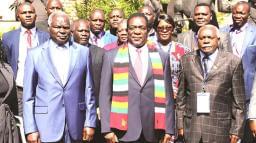FIRST Capital Bank (FCB) is engaged in talks with the African Development Bank and Trade Development Bank for credit lines for on lending to sectors of the economy as the bank seeks to grow the interest income base.
Last year, FCB secured credit lines worth US$33,32 million.
In its financial year ended December 31, 2023, FCB secured a €12,5 million (US$13,32 million) credit line from the European Investment Bank of which 81% had been drawn by year end.
Last year also saw FCB securing another US$20 million credit line from the African Export-Import Bank, with US$6 million having been drawn down by year end.
“The €12,5 million European Bank line of credit was 81% fully drawn during the period under review providing significant capital funding relief to medium-sized corporate customers,” FCB chief executive officer Tapiwa Mushoriwa said, in a statement attached to the financial results for year ended December 31, 2023.
“A further US$20 million line of credit has been mobilised with the African Export-Import Bank with US$6 million already drawn down as at 31 December 2023. The bank continues to engage various financiers for additional lines of credit with African Development Bank and Trade Development Bank at varying stages.”
Last year, loans and advances to customers rose 30,45% to US$86,06 million from the 2022 comparative of US$65,97 million.
Mushoriwa said 92% of the business had been underwritten in US dollars.
“The bank posted a consolidated adjusted profit after tax of US$15,4 million for the year 2023. This was supported by a 33% increase in total income over the period from US$53,4 million in 2022 to US$71,2 million for the year ended December 31, 2023,” he said.
“This growth was driven by an improvement in the underlying business, driven by growth of the customer base, increase in loans and advances, and an increasing proportion of US$ transactions. Active management of the currency positions also resulted in exchange gains.”
Despite this, FCB’s total assets only saw a slight uptick to US$235,94 million last year from 2022’s comparative of US$233,94 million.
This was mostly because the bank saw reductions in property and equipment values, investment in joint venture, investment securities, and cash and bank balances.
“The loan loss ratio increased from 2% in 2022 to 5% in 2023 with exposures exhibiting increased credit risk being largely within the agriculture portfolio. While the overall default risk increased, this was within the bank’s appetite,” Mushoriwa said.
He further noted that operating expenses increased by 55% from US$30 million in 2022 to US$46,7 million in the year under review.
“This resulted in the cost to income ratio moving from 56% in 2022 to 66% in 2023. The Bank continues to actively pursue cost optimisation strategies to manage the overall cost base,” Mushoriwa said.
“We are a growing bank and will continue to pursue strategies that will deliver an improved quality of service to our customers whilst generating value and growth for all stakeholders. We are shaping our operating model for long-term sustainability whilst we impact all critical sectors of the economy and will endeavour to remain relevant in all our chosen markets.”
FCB chairperson Patrick Devenish said the bank’s core capital increased by 3% to US$52,5 million from 2022.
Source NewsDay











